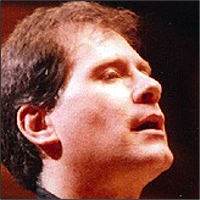Charles Peltz
// Director of Wind Ensemble ActivitiesCHARLES PELTZ is the Director of Wind Ensemble Activities at the New England Conservatory Of Music, among the world’s most prestigious institutions for music education. The NEC is located in Boston, Massachusetts, and is widely known as the oldest independent music conservatory in the United States. Charles Peltz has conducted several symphony orchestras throughout North America, including the Buffalo Philharmonic, Pacific Symphony in Los Angeles, and the New York-based Ensemble Sospeso.
Website: www.gfso.org
Photo: Charles Peltz / New England Conservatory of Music
Interview:
I don’t believe that music, or any man made artifact, has inherently a spiritual element. Music, like any great art, can ennoble, inspire, challenge, comfort, enrage; it can produce the gamut of human reactions and emotions. Encountering great music is a unique human experience, often a transcendent one. Through the encounter one senses a rising above the mundane, the everyday worldly and to experience a highest point of human creation. In reaction to this highest human creation are the highest human responses: emotional, intellectual and visceral. But these human reactions are not evidence of the spiritual.
It is a tragedy when people confuse an unusually intense human experience with the spiritual. By attributing a high point of human experience to some other non-human source, we tragically diminish the great humanness in it. Whether it is the birth of a child, the bliss of true love or the encounter with a great work of art, our rush of emotion is a peak human moment. We should cherish and celebrate it. We should not let go of this joy in human experience. However, our human experience, untouched by God or the Holy Spirit, is not spiritual. Something truly spiritual comes from a Holy Spirit; a presence sent by God to touch humanity. The presence of that spirit transcends the most transcendent artifacts of man. One encounters the Spirit at the place where humanity and its creations leave off and something greater than man begins. It is at this junction of man’s greatest efforts upward, and God’s downward, where certain music has been imbued by the Holy Spirit. Many composers over time have been devout believers. Many have not. Does the Holy Spirit touch only those who believe? If not, who then has written “spiritual” music? Like many questions of faith honestly engaged, there is simply no clear answer. Bach, Haydn, Bruckner, Messiaen – all devout. Is their music more spiritual than Mozart, Beethoven, Cage – people who were supremely or “supernaturally” gifted, who searched genuinely and asked sincere and penetrating questions about their existence but ultimately resisted surrender to God?
One answer is clear: the power of God is limitless. He can do His work and send His Spirit through any number of people. Without question, believers and non-believers have been greatly edified, have been spiritually engaged, by Bach or Messiaen as well as by Mozart or Cage. Experiences with myriad composers spark listeners who encounter their music to ask: “What power has moved me in this way?”, “Why am I more deeply affected by this music than by other music that I hear?” Those questions are the first steps towards a recognition of a greater power and are the steps towards God that we might take. If the music created by a composer is spiritual, regardless of his or her own beliefs, it is because God chose to speak to each composer and to the listener, through the vehicle of His Holy Spirit.
It is accepted that as language evolves, words lose their original, often limited and specific, meanings. One of these may be the word “spiritual”. Is it possible that we now call certain experiences spiritual when at one time we may have more thoughtfully called them “sublime” or “transcendent” or “awesome”. It may be that we should more acutely recognize the meaning of words and more importantly the power that may lie behind them. In doing so, we would render what is due to that which comes truly from Spirit.
“Encountering great music is a unique human experience, often a transcendent one.”
– Charles Peltz, Director of Wind Ensemble Activities, New England Conservatory of Music Boston, Massachusetts


